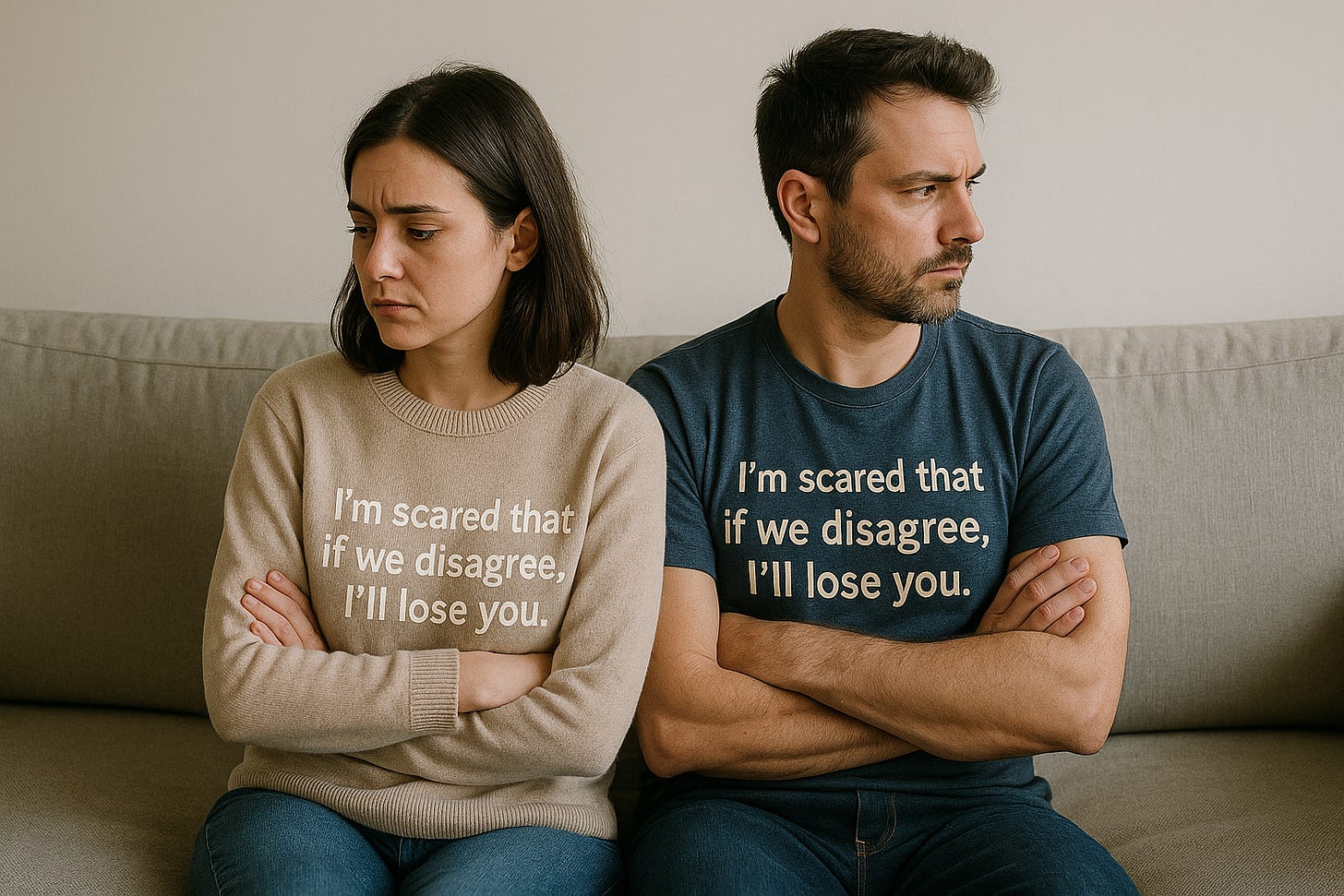When the Real Issue Is That It’s Not Safe to Disagree
The argument isn’t the problem. It’s what your body believes will happen next.
Most couples believe they’re arguing about the topic in front of them.
The budget. The holidays. The dishes left in the sink.
But when you slow down and look closely, the surface argument almost never holds the real story. What’s actually happening is far deeper: the conversation has touched the question of whether it’s truly safe to see the world differently from the person you love — and still trust that you won’t lose each other.
Why It Feels So High-Stakes
Disagreement, in its healthiest form, is simply two people bringing their full selves into the relationship. But for many of us, difference doesn’t feel neutral. It feels dangerous.
If you grew up in an environment where conflict meant yelling, punishment, withdrawal, or icy silence, your nervous system learned that difference equals pain. Over time, that belief became so deeply wired that now, when your partner says “I don’t see it that way,” your body doesn’t just hear another opinion. It hears a threat.
You might feel your stomach drop, your breath tighten, or your jaw set before you’ve even had a chance to think. And it’s not because you’re overreacting or “too emotional” — it’s because your body remembers what difference used to mean. It remembers what it was like when disagreement was a doorway to disconnection.
The Patterns We Fall Into
For some, that fear takes the shape of attack. Your words get sharper. Your voice rises without your permission. You find yourself building a case, stacking evidence, speaking faster to make them understand — all in the hope that if you can win the point, you’ll be safe again.
For others, it’s retreat. Your voice goes quiet. You stop meeting their eyes. You nod to get through the moment even though you’re pulling further and further inside yourself. You tell yourself it’s not worth it, but what you really mean is I’m not sure we can survive this.
Sometimes, you switch between the two. You start by pushing harder, and when that doesn’t work, you shut down completely. Underneath both strategies is the same unspoken truth: I’m scared that if we disagree, I’ll lose you.
What Happens After
The conversation might end, but the disconnection lingers. You sit at opposite ends of the couch scrolling your phones. You pass each other in the kitchen without touching. You go to bed turned away from each other, the silence in the room heavier than any words you could have said.
By then, the original topic barely matters. It’s not about the dishes, the trip, or the bank account anymore. It’s about the body’s desperate attempt to protect itself from what it believes is danger. And when both people are in protection mode, connection becomes almost impossible.
Relearning Safety in Difference
Real security in a relationship isn’t about agreeing on everything. It’s about trusting that the connection between you can hold disagreement without collapsing.
That might mean slowing your pace when every part of you wants to speed up. It might mean naming what’s underneath the argument — saying, “I’m scared you’ll pull away if I tell you how I see this,” even if it feels awkward or vulnerable. And it might mean offering small but powerful reassurances in the moment, like, “We’re okay. We just see this differently.”
These moments may feel unnatural at first, especially if you’ve never experienced them before. But over time, they begin to teach your nervous system a new truth — that difference does not have to mean distance, and that love can survive disagreement.
The Bottom Line
Disagreement doesn’t break relationships. The fear that love won’t survive it does.
When you create emotional safety, the places where you don’t see eye to eye stop being a threat and start being opportunities to understand each other more deeply.
Let’s Talk About This
If this feels familiar and you want to change it, this is exactly the kind of cycle we address inside The Emotional Reset Code™ — my 6-week live coaching program that helps you stop love-sabotaging patterns and rewire your nervous system so you can feel safe, grounded, and fully yourself in your relationship.
We work on the real, embodied shifts that traditional “communication tips” don’t reach — regulation, trust repair, and building the kind of emotional safety where differences don’t turn into disconnection.
If you’ve been reading this and thinking, This is me, I’d love to hear from you.
Click here to send me a message directly at
[email protected] — and tell me about your biggest challenge with conflict in your relationship.
I’ll personally point you toward resources and let you know when the next round of The Emotional Reset Code™ is starting.



